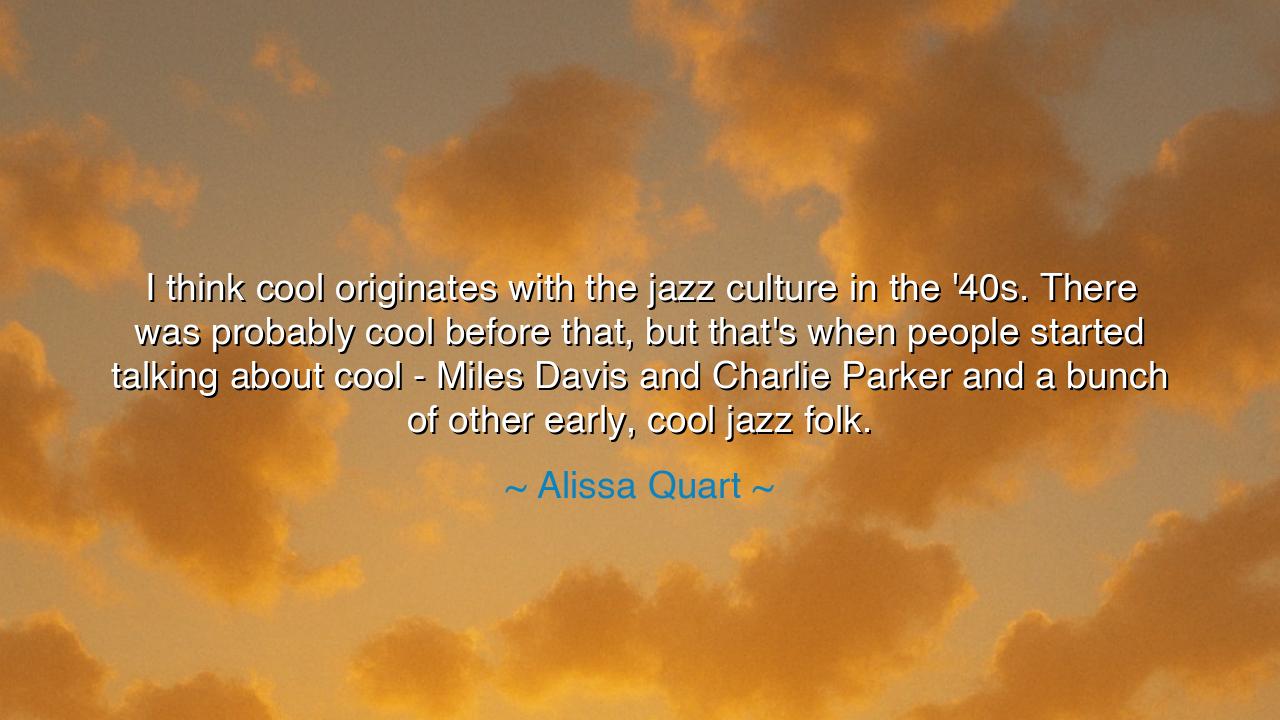
I think cool originates with the jazz culture in the '40s. There
I think cool originates with the jazz culture in the '40s. There was probably cool before that, but that's when people started talking about cool - Miles Davis and Charlie Parker and a bunch of other early, cool jazz folk.






The writer and cultural observer Alissa Quart once reflected upon a word that has crossed generations and transcended language: “I think cool originates with the jazz culture in the '40s. There was probably cool before that, but that's when people started talking about cool — Miles Davis and Charlie Parker and a bunch of other early, cool jazz folk.” These words carry more than nostalgia; they reveal the birth of an idea that reshaped how humanity expresses confidence, rebellion, and grace. In her reflection, Quart reaches beyond fashion or attitude—she touches the essence of self-possession, that quiet flame within the soul that burns without apology.
In the manner of the ancients, let us begin by understanding what “cool” truly means. It is not arrogance, nor indifference, nor pretense. It is a state of harmony—of moving through chaos with poise, of facing the world’s noise with inward calm. Quart reminds us that though the quality may have existed since the dawn of human art, it found its voice and rhythm in the jazz age of the 1940s. There, amid smoke-filled clubs and dim lights, a new philosophy emerged—one that celebrated individuality over conformity, improvisation over rigidity, and soul over spectacle. The musicians of that time did not just play notes; they shaped a way of being.
The origin of cool, as Quart observes, lies in the music of visionaries like Miles Davis and Charlie Parker, whose horns spoke a language of rebellion wrapped in elegance. These were men who turned struggle into sound, who transformed pain into poetry. In their music, you could hear both defiance and restraint, both freedom and discipline. The coolness they embodied was not the absence of feeling—it was the mastery of it. To play jazz was to walk the knife’s edge between chaos and control, to dare without boasting, to shine without demanding to be seen. Thus, “cool” was born not in silence, but in the rhythmic conversation of courage.
Consider Miles Davis, who would stand on stage with his back to the audience, lost in the trance of his own creation. Some saw this as arrogance, but in truth, it was devotion. He did not play to please—he played to speak. His music, unpredictable and alive, demanded attention not through noise, but through mystery. This was the essence of the cool philosophy: the power of understatement, the elegance of restraint, the wisdom of those who do not shout to be heard. Like the stoics of old, Davis and his peers embodied serenity amid turbulence—a modern echo of ancient composure.
Quart’s observation also reveals something deeper about culture itself. The rise of cool jazz came at a time when the world was recovering from war and grappling with conformity. In the midst of rigid norms and industrial order, the jazz musicians created a new code of honor—one that valued authenticity above obedience. They said, in sound and spirit, that true greatness is not about imitation but improvisation. Each note was an act of freedom; each performance, a declaration that life, like jazz, is meant to be lived unscripted. Thus, “cool” became not just a style, but a rebellion against fear.
O seekers of wisdom, take this teaching to heart: coolness is not performance—it is presence. It is born from knowing who you are and refusing to be rushed or defined by others. The “cool” of the jazz age was not a mask, but a mirror—a reflection of self-trust and inner rhythm. To live coolly is to walk through life as Miles walked through music: with courage, curiosity, and calm. It is to face the noise of the world with the silence of understanding, to answer cruelty with grace, and to move with the rhythm of your own truth.
And so, let this lesson endure: the future of cool does not lie in imitation but in integrity. Learn from the jazz masters—listen before you speak, create rather than copy, flow rather than force. Be unshaken amid noise, authentic amid pretense, brave amid uncertainty. Whether you hold a trumpet or a dream, play your song as they did—boldly, freely, and from the heart. For “cool,” as Alissa Quart reminds us, is not a passing trend but a timeless art—the art of being oneself, unafraid, in perfect tune with the rhythm of life.






AAdministratorAdministrator
Welcome, honored guests. Please leave a comment, we will respond soon